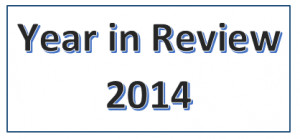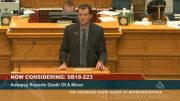By Jeffrey A. Roberts
CFOIC Executive Director
Year-in-review lists can help us see a bigger picture sometimes.
For the CFOIC, revisiting 2014 reveals a somewhat troubling string of stories about issues and problems affecting government transparency in Colorado. Consider them one by one, as we did throughout the year, and you might not be all that concerned. But put them in a list, as we’ve done here, and you could reasonably conclude that open government in the Centennial State is still a work in progress.
That’s not to say there wasn’t good news on the transparency front in 2014. There was, and we’ll start with some:
CORA fees. State lawmakers helped make the cost of public records more affordable in many jurisdictions with the passage of HB 14-1193, sponsored by Rep. Joe Salazar and Sen. John Kefalas. For the first since the Colorado Open Records Act (CORA) was enacted in 1969, the law now specifies a maximum rate ($30 per hour) for researching and compiling public records that aren’t criminal justice records, setting a standard for all governments in the state. The first hour must be provided at no charge. Previously, as a Colorado Ethics Watch report showed, charges for public records in Colorado were “all over the map.” The law did have an unintended consequence – some governments that were charging less than $30 per hour started charging the maximum rate.
Challenging Sunshine Law violations. The Arvada City Council’s use of secret ballots last January led to the passage of HB 14-1390, which ensures that anyone has legal standing to challenge violations of the Open Meetings Law, aka the Sunshine Law. A Jefferson County judge had tossed out a lawsuit filed by Arvada resident Russell Weisfield, who balked when the council filled a vacancy by marking unsigned sheets of paper four times to eliminate candidates, in apparent violation of a 2012 provision in state law. The judge, while acknowledging that “the voting procedure may have violated the secret ballot provision” of the statute, ruled against Weisfield because he couldn’t prove he had been personally harmed by the council’s hidden votes. The bill to fix the standing issue flew through the legislature without a single no vote.
 Pueblo emails. Two Pueblo City Council members resigned and another faces a recall following allegations in the Pueblo Chieftain that they engaged in illegal email meetings with a county employee. The council members were accused of working on their own covert agenda on trash hauling and other issues. It’s a violation of the Sunshine Law if three or more members of a local public body – two if that constitutes a quorum – discuss public business via email or text messaging.
Pueblo emails. Two Pueblo City Council members resigned and another faces a recall following allegations in the Pueblo Chieftain that they engaged in illegal email meetings with a county employee. The council members were accused of working on their own covert agenda on trash hauling and other issues. It’s a violation of the Sunshine Law if three or more members of a local public body – two if that constitutes a quorum – discuss public business via email or text messaging.
Poudre emails. A 7NEWS investigation found that the Poudre School District in Fort Collins had purposely destroyed emails and paper records related to a special-education student to prevent the child’s family from getting them under CORA. “Delete your message!” “Delete your deleted!” “Delete your sent!” Those words from the boy’s principal to other school district employees were in emails obtained by the family. Obviously, not all of the emails had been trashed.
Colorado Springs emails. Supervisors at Colorado Springs Utilities tried to avoid releasing information about a power plant fire by instructing employees to include the words “attorney-client privilege” in emails about the fire. The attorney-client CORA exemption applies only to bona fide legal advice. After The Gazette exposed the practice, the mayor ordered that it be stopped.
Fort Collins emails. While some jurisdictions had trouble with officials using or misusing email, Fort Collins made it easier for the public to see City Council email exchanges without having to file an open-records request. The city’s Email Transparency Project is an online archive of emails to and from council members with limited exceptions (senders can ask that public visibility be blocked by putting #PRIVATE in the subject line).
Choosing a city manager in secret. The Denver suburb of Englewood announced the hiring of a new city manager in August, more than a week before the City Council was set to vote on the appointment in a public meeting. The city didn’t seem to care that the Sunshine Law expressly prohibits the “adoption of any proposed policy, position, resolution, rule, regulation or formal action” during a closed-door executive session. “The council’s posting on its website, that they’ve reached full agreement, is an admission that they’ve violated the Open Meetings Law,” said CFOIC President Steve Zansberg, a First Amendment attorney.
Using FERPA as an excuse. The superintendent of Littleton Public Schools deflected reporters’ questions about threats made by student Karl Pierson before the Arapahoe High School shooting a year ago, citing the federal Family Educational Rights and Privacy Act (FERPA) as a reason he couldn’t talk about it. But the FERPA rights of an adult student lapse upon his or her death, according to the U.S. Department of Education. Pierson was 18 when he opened fire, killing a fellow student before killing himself.
School violence reports. State data on campus violence showed no violent incidents at Arapahoe High during the 2013-14 school year, despite the December shooting that left Claire Davis and the gunman dead. The Colorado Department of Education called the omission a processing error, but a Denver Post/7NEWS investigation showed significant shortcomings in the state’s system for reporting school safety information to the public.
Barring the press, No. 1. In January, a reporter for the Craig Daily Press was twice denied access to a public meeting on sage grouse conservation in Moffat County. The meeting included the governor and county commissioners as well as U.S. Interior Secretary Sally Jewell, who in a letter to the newspaper called the incident a regrettable “miscommunication.” Jewell said her department was “redoubling…efforts to coordinate with local government offices to ensure transparency and respect for important press freedoms.”
Barring the press, No. 2. The House and Senate agriculture committees blocked a Durango Herald reporter from attending a field trip to a marijuana cultivation warehouse. Although lawmakers considered several pot-related bills during the 2014 session, they excluded the public “based on the finding that we weren’t conducting any official business,” Rep. Randy Fischer told the newspaper. The field trip, however, had been noticed on the legislature’s daily agenda as a meeting of the two committees. “The public cannot be excluded from a meeting that is noticed as a public meeting,” Zansberg said.
Barring the press, No. 3. In November, a reporter for the Collegian student newspaper at Colorado State University was kept out of a hearing at which the student government impeached an elected senator. The student government’s vice president and CSU’s administration claimed that Colorado’s Open Meetings Law doesn’t apply to the Associated Students of Colorado State University (ASCSU). But ASCSU seems to fit the criteria for being a public body under the law: It was formally constituted by CSU and controls the allocation of more than $2 million of student funds.
Newspapers seen as “electioneering.” Larimer County Clerk and Recorder Angela Myers determined that copies of the Collegian, displaying a front-page photo and story about U.S. Sen. Mark Udall’s campaign visit to the CSU campus, had been placed too close to a ballot drop-off area, in her mind a violation of Colorado’s electioneering statute. She reversed course upon receiving a cease-and-desist letter from Zansberg as the newspaper’s attorney. Routine news coverage, Zansberg noted, “plainly is not campaigning for or against any candidate or ballot initiative.”
An expensive autopsy report. The Routt County Coroner’s Office sued the Steamboat Pilot & Today, seeking to block the release of an autopsy report on the death of 3-year-old Austin Davis. A judge ordered the report’s release and directed the county to reimburse the newspaper $10,287.85 for legal fees. “So this basically ends up being a very expensive lesson,” county Commissioner Steve Ivancie said.
Open teacher labor talks. Colorado voters in November overwhelmingly approved Proposition 104, an Independence Institute-sponsored initiative that requires school districts to let the public observe collective bargaining negotiations. Opponents said that open negotiating sessions should be a matter of local control, but those calling for greater transparency noted that personnel costs make up the vast majority of a school district’s operating budget.
Executive sessions in Boulder. The Boulder City Council held it’s first-ever closed-door meeting after voters gave council members limited permission to discuss municipalization-related strategies in secret. Recordings of closed sessions will be kept at least through the end of 2022.
Sheriff Maketa’s apology video. El Paso County Sheriff Terry Maketa, accused of having affairs with female subordinates and other misdeeds, made a video on which he apologized to his employees for inappropriate behavior. The sheriff’s department initially denied CORA requests for the tape, claiming it had nothing to do with sheriff’s office functions and, therefore, did not fit the definition of a public record. Maketa eventually relented and released the video.
Death penalty records. The CFOIC and a consortium of media organizations successfully persuaded an Arapahoe County judge to unseal transcripts in the case against death-row inmate Sir Mario Owens. Transcripts of proceedings held in open court had been kept secret more than five years after Owens and Robert Ray were sentenced to die for killing Javad Marshall-Fields, a witness in a murder case against them, and Marshall-Fields’ fiancée, Vivian Wolfe. “The public’s right to know what transpires in its courtrooms was vindicated today,” said media attorney Ashley Kissinger.
Reporter’s shield. Jana Winter, a reporter for Fox News in New York, learned that she won’t be compelled to reveal the identity of confidential sources who gave her information about the Aurora movie theater gunman’s notebook. Lawyers for defendant James Holmes had appealed a New York court order shielding Winter from testifying. A bill to strengthen Colorado’s press shield, introduced because of Winter’s ordeal, died in a Colorado Senate committee.
Newspaper wins lawsuit. The Herald-Democrat in Leadville successfully sued the Lake County Commission for violating the Open Meetings Law by holding an executive session without giving notice. The commissioners made the decision to appeal via email, rather than at a public meeting, raising additional transparency questions.
Follow the Colorado Freedom of Information Coalition on Twitter @CoFOIC. Like CFOIC’s Facebook page. Do you appreciate the information and resources provided by CFOIC? Please consider making a tax-deductible donation.




